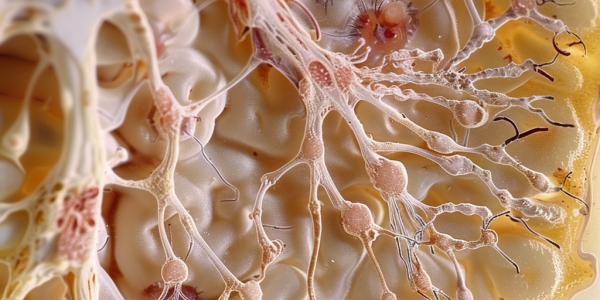New Research Uncovers Metabolic Disruptions in Parkinson’s Disease
Recent research from Fujita Health University reveals significant metabolic disruptions in Parkinson’s disease, particularly in purine metabolism and ATP recycling. The study highlights lower uric acid levels in PD patients, suggesting a complex relationship influenced by factors like sex and age. These findings pave the way for innovative therapeutic strategies aimed at enhancing energy metabolism, potentially improving the quality of life for those affected by Parkinson’s disease.
Breakthrough Nasal Spray Targets Toxic Tau Proteins in Alzheimer’s Treatment
Researchers at the University of Texas Medical Branch have developed a groundbreaking nasal spray that effectively targets and clears toxic tau proteins from the brain, marking a significant advancement in Alzheimer’s treatment. This innovative therapy could revolutionize how neurodegenerative diseases are managed, offering new hope for millions affected by cognitive decline.
Promising Results in Alzheimer’s Disease Treatment Study
Promising results in the treatment of Alzheimer’s disease have been revealed in a recent study, showing that a peptide treatment could potentially reverse some of the symptoms associated with the condition. With the global population aging, dementia, including Alzheimer’s disease, is becoming a significant concern, making the potential for a treatment that could reverse cognitive decline a significant development in the field of neurodegenerative disorders.
Groundbreaking Discovery in Parkinson’s Disease Research
Groundbreaking research on Parkinson’s disease reveals potential FDA-approved treatment targeting cell surface protein Aplp1 and Lag3 to block spread of harmful material. Findings suggest promising therapy avenue already available, offering hope to millions worldwide.
Link Between Gut Bacteria and Parkinson’s Disease Uncovered in Recent Study
A recent study from Nagoya University Graduate School of Medicine in Japan found a connection between gut bacteria, B vitamin deficiency, and Parkinson’s disease. The research suggests that supplementing B vitamins could be a potential therapeutic approach for treating PD, which affects around 1-2% of individuals aged 55 and older. The study highlights the role of gut microbiota in maintaining the intestinal barrier and preventing toxin penetration into the bloodstream, ultimately impacting brain health and neurotransmission processes.
Remarkable Improvement in Brain Health of Alzheimer’s Patient
Discover the astonishing improvement in brain health of a patient battling early signs of Alzheimer’s disease. Learn how lifestyle changes, not medication, played a key role in transforming the brain biomarkers of Simon Nicholls. Find out how his proactive approach to health management offers hope for those with genetic predispositions to Alzheimer’s.
New Biomarker miR-519a-3p Discovered for Asymptomatic Stages of Alzheimer’s Disease
Researchers have discovered a new biomarker, miR-519a-3p, that could be used for early diagnosis and treatment of Alzheimer’s disease in its asymptomatic stages. This microRNA is associated with the cellular prion protein and could enhance diagnostic accuracy in the early stages of the disease. Join our webinar to learn more about the role of organoids in advancing treatment for neurological disorders.
Study Reveals Promising Therapeutic Target for Traumatic Brain Injuries
Groundbreaking study by Gladstone Institutes identifies fibrin as a key player in triggering neurodegeneration post-traumatic brain injury, offering hope for targeted therapies to mitigate long-term effects and prevent neurodegenerative conditions. Research sheds light on blood-brain barrier leaks and potential treatment avenues for Alzheimer’s and multiple sclerosis.
Eye Tests Show Promise in Predicting Parkinson’s Disease Progression
A recent study has found that measuring the thickness of the retina through eye tests can help predict the progression of Parkinson’s disease. By identifying retinal degeneration early, routine eye exams could become a non-invasive tool for predicting the severity of symptoms, leading to more targeted treatment strategies and better outcomes for patients.
New Study Targets Microglia to Fight Alzheimer’s Disease
Researchers at Washington University School of Medicine are focusing on mobilizing microglia, the brain’s immune cells, in the fight against Alzheimer’s disease. Dr. Marco Colonna’s study explores targeting a receptor on microglia to combat harmful amyloid plaques. By developing an antibody to block the receptor, the team reduced plaque formation in animal models. This research opens new possibilities for Alzheimer’s drug development beyond current FDA-approved medications.










